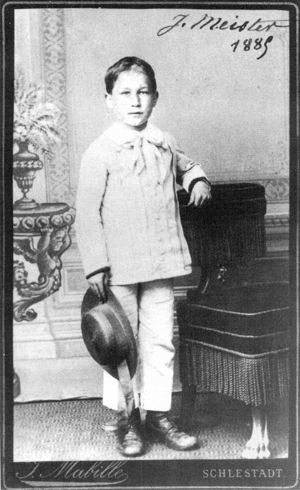Joseph Meister
Joseph Meister (1876–1940) was a French individual known for being the first person to receive the rabies vaccine, a groundbreaking development in the history of medicine. His treatment was administered by Louis Pasteur, a renowned scientist whose work in microbiology and vaccination has saved countless lives.
Early Life[edit | edit source]
Joseph Meister was born on February 21, 1876, in Alsace, which at the time was part of the German Empire (now France). Little is known about his early life until the event that would link him forever to medical history.
Rabies Incident[edit | edit source]
In July 1885, at the age of 9, Meister was severely bitten by a rabid dog. At this time, rabies was almost always fatal once symptoms had appeared. Louis Pasteur, who had been working on a rabies vaccine using attenuated (weakened) viruses, was approached by Meister's mother, who had heard of his research. Despite the vaccine never being tested on humans, Pasteur decided to administer it to Meister in an attempt to save his life. This decision was fraught with risk, both medically and legally, as Pasteur was not a licensed physician.
After the Treatment[edit | edit source]
Joseph Meister recovered fully, demonstrating the potential of vaccination against rabies. This event marked a significant milestone in the development of vaccines and the treatment of viral diseases. Meister's successful treatment received widespread attention and contributed to the acceptance and further development of vaccines.
Later Life[edit | edit source]
After his recovery, Meister lived a relatively obscure life. He later returned to work with Pasteur and became the gatekeeper of the Pasteur Institute, a role he held with pride until his death. Joseph Meister's life took a tragic turn during World War II when, according to reports, he committed suicide in 1940 to avoid being taken prisoner by the invading German forces.
Legacy[edit | edit source]
Joseph Meister's case is a landmark in medical history, illustrating the potential of vaccines to save lives. It also highlights the ethical considerations and risks involved in the development of new medical treatments. Meister's story is often cited in discussions of medical ethics, the history of vaccination, and the fight against rabies.
Search WikiMD
Ad.Tired of being Overweight? Try W8MD's NYC physician weight loss.
Semaglutide (Ozempic / Wegovy and Tirzepatide (Mounjaro / Zepbound) available. Call 718 946 5500.
Advertise on WikiMD
|
WikiMD's Wellness Encyclopedia |
| Let Food Be Thy Medicine Medicine Thy Food - Hippocrates |
Translate this page: - East Asian
中文,
日本,
한국어,
South Asian
हिन्दी,
தமிழ்,
తెలుగు,
Urdu,
ಕನ್ನಡ,
Southeast Asian
Indonesian,
Vietnamese,
Thai,
မြန်မာဘာသာ,
বাংলা
European
español,
Deutsch,
français,
Greek,
português do Brasil,
polski,
română,
русский,
Nederlands,
norsk,
svenska,
suomi,
Italian
Middle Eastern & African
عربى,
Turkish,
Persian,
Hebrew,
Afrikaans,
isiZulu,
Kiswahili,
Other
Bulgarian,
Hungarian,
Czech,
Swedish,
മലയാളം,
मराठी,
ਪੰਜਾਬੀ,
ગુજરાતી,
Portuguese,
Ukrainian
Medical Disclaimer: WikiMD is not a substitute for professional medical advice. The information on WikiMD is provided as an information resource only, may be incorrect, outdated or misleading, and is not to be used or relied on for any diagnostic or treatment purposes. Please consult your health care provider before making any healthcare decisions or for guidance about a specific medical condition. WikiMD expressly disclaims responsibility, and shall have no liability, for any damages, loss, injury, or liability whatsoever suffered as a result of your reliance on the information contained in this site. By visiting this site you agree to the foregoing terms and conditions, which may from time to time be changed or supplemented by WikiMD. If you do not agree to the foregoing terms and conditions, you should not enter or use this site. See full disclaimer.
Credits:Most images are courtesy of Wikimedia commons, and templates, categories Wikipedia, licensed under CC BY SA or similar.
Contributors: Prab R. Tumpati, MD

